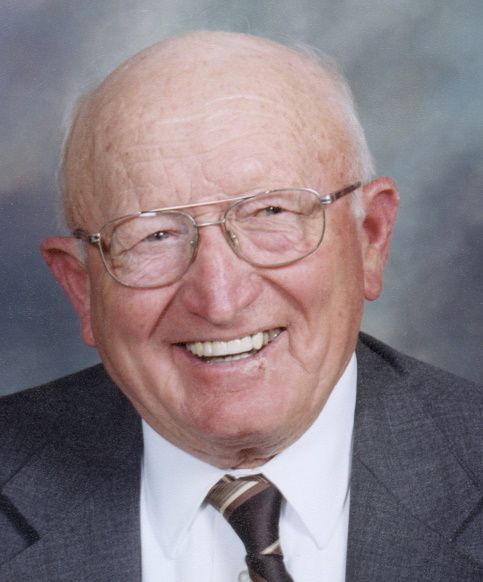Fred Koch Jr. 1922 - 2020

In Loving and Grateful Memory
Fred Koch Jr. began life on May 5, 1922, in Saskatchewan, Canada. He was the second oldest son of what would become a family of six daughters and three sons of the Koch family, offspring of Friedrich Koch Sr. and Anna Katherine (Beisel) Koch.
He graduated from McMinnville schools. Fred and his brother Ezra worked in the family garbage business which began in 1928 in McMinnville, Oregon, by his father, who became a naturalized U.S. citizen. Throughout junior high and high school, the two boys had garbage routes after school. They also were instrumental in operating the family farming enterprise.
Upon high school graduation, World War II had broken out, and Fred joined the U.S. Army, assigned to the European Theater and Ninth Army after basic training. He survived the Battle of the Bulge because of measles. He had the measles in a hospital in Belgium, and there was no company left following the battle; they had all been killed. He was reassigned to the Big Red I, a company that followed the leading edge of the Fighting Ninth.
This company was tasked with initiating town services, the first chore of occupation. His exploits and prowess in the German language were critical and included tapping the military phone system to talk to the Chancellery. He survived Russian fighter attacks with Lt. Johnson. Their task was to stop the flow of civilians fleeing Berlin so that the German soldiers could surrender. The event, near Remagen, took place on a partially destroyed bridge. The end of the day saw over 250,000 German soldiers surrendered, and they eventually returned to their homeland to rebuild it. He was awarded a Purple Heart for this heroism, but he refused a promotion to Captain, fearing it would keep him in the war longer. He later saw service in the motor pool for the Nuremberg trials, transporting and guarding Albert Speer and others to and from Nuremberg Prison. He eventually accepted a small promotion and was discharged as a Corporal II.
His expert marksmanship insignia was well-used, feeding German civilians deer he killed overseas. When he returned to McMinnville, he became an avid sportsman. He was highly accurate in Oregon with elk and white-tail deer. However, he developed a reputation of being an expert duck hunter and duck caller. Hunting buddies became particularly grumpy with his succession of triples over the hunting week. His dogs were legend. If Fred were not shooting a duck, the inpatient dog would go find one on the water and set it loose alive in the blind. He had introduced many young men and women in this community to the sport of duck hunting.
This was not his only sport: To say he was an avid fisherman is an understatement. Although he sang in the Presbyterian Church Choir with his wife, Barbara, he was known to announce during practice when the chances were good that he had to visit a sick relative (the fish) on the Nestucca River at Hebo. During the early years of his marriage to his faithful wife Barbara, the two of them would spend many weekends fishing throughout Oregon: the McKenzie River, the Deschutes, Wickiup Reservoir, and the Rogue and Umpqua. It might be accurately said that he could think like a fish. His children, Malcolm and Grace Ann, could not remember any time during fishing seasons that they didn’t stumble over fish to get into the house at the back door. The bounty of fish was always shared with anyone in need or not, employees of the garbage company, good friends, and neighbors. No visitor was turned away from the Koch home during mealtime. If a fish could be added, they were invited to be seated at the dinner table and fed. This was a German family tradition started by his parents, who always had food available to the many visitors to their home traveling Sundays from the German Congregational Church in Portland.
His brother, Ezra, urged a project forward because of his great interest in gardening. He had azalea seeds purchased through the local feed store. Family history is in dispute on this, but the seeds came purportedly from either England through Japan or the Royal Japanese Garden. Fred waited until 1955 to commence the azalea project. He used to say that garbage was stinking work, and when he got home, he wanted to look at beauty. His intent was to give away the azaleas to beautify McMinnville in public plantings at churches, schools, hospitals, or anyone that would want to have an azalea. This became a family project. Eventually, the family enlisted the help of men’s and women’s gardens clubs, Kiwanis, Rotary, Boy and Girl Scouts, the high school M Club to help dig the holes for the azaleas. Eventually, he grew and gave away 55,000 azaleas in McMinnville. He had filled the town with so many azaleas there was little room for more plants. The last 5,000 were given to every elementary school boy and girl in McMinnville schools: for parents on Father’s Day and Mother’s Day. Unwittingly, this seeded a project with the students of Memorial School who wanted to fundraise so Memorial could have hanging baskets.
Then he retired at the age of 62. He became bored. And, coincidentally with his wife Barbara’s service on the session of the Presbyterian Church Rebuilding Committee, a project was designed to landscape the church. By then his son Malcolm had also become an elder. The only unfinished task was the church bell tower. Forsaking three flagpoles and a “nice planning," Fred figured out a way to remove the bell from the tower, construct a freestanding bell tower from recycled metal, and electronically make it ring. As he was getting ready to erect the tower, he realized he needed some nice finials at the top. He found them in Springfield, Oregon, at a company that sold antique-looking light poles. As an afterthought, he bought two poles. He figured out how to light the pole and water huge 24-inch hanging baskets. Following that dedication Sunday, the calls began from people wanting baskets at businesses, churches, schools, City Hall and the Fire Department. He helped restore the Fire Hall bell, too. Finally, the family put up so many poles, that 172 baskets were too much. So, he taught Country Gardens Nursery how to do it. Along the way, he cooked salmon and steak for company picnics post-Azalea projects and the Portland Garden Club.
He was a devoted family man. Growing up included three-week vacations throughout the United States, to Ohio, Texas, Nevada, Washington, D.C. and more. His motto was always, “if you are down in the mouth, depressed, don’t waste your time. Go do something for someone else.”
He was married for 72 years. He is survived by his wife, Barbara L. Koch, 92, of McMinnville; his son, Malcolm L. Koch, 69, of McMinnville; his daughter, Grace Ann Koch, 67, of Medford; and his beloved sister, Lydia Zimmerman, 91, of Bakersfield, California.
Graveside service will be held at 11:00 a.m. August 6, at Evergreen Memorial Park Cemetery. Viewing will take place from 4:00 to 7:00 p.m. August 5, at the Chapel of Macy & Son. To leave condolences, visit www.macyandson.com












Comments
glw
This community will miss Fred. McMinnville is a better place because of Fred and his brother Ez. They knew every family and all their children. They were all ways willing to take on and promote any thing McMinnville needed. Rest in Peace Sir..